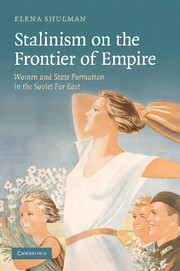Book contents
- Frontmatter
- Contents
- List of illustrations
- Acknowledgments
- Glossary
- Note on the text
- Introduction
- 1 Women and Soviet power
- 2 “Where steel cracks like glass”
- 3 “Our famous Valia”: the rise of a Soviet notable
- 4 “Envy for everything heroic”: women volunteering for the frontier
- 5 “Bol'shevichki were never ascetics!”: female morale and Communist morality
- 6 Snivelers and patriots
- Conclusion
- Appendices
- Selected bibliography
- Index
4 - “Envy for everything heroic”: women volunteering for the frontier
Published online by Cambridge University Press: 19 July 2009
- Frontmatter
- Contents
- List of illustrations
- Acknowledgments
- Glossary
- Note on the text
- Introduction
- 1 Women and Soviet power
- 2 “Where steel cracks like glass”
- 3 “Our famous Valia”: the rise of a Soviet notable
- 4 “Envy for everything heroic”: women volunteering for the frontier
- 5 “Bol'shevichki were never ascetics!”: female morale and Communist morality
- 6 Snivelers and patriots
- Conclusion
- Appendices
- Selected bibliography
- Index
Summary
The Far Eastern landscape – pristine, primordial, and on a permanent war footing – functioned as a congenial backdrop for patriotic fantasies. Events and conditions along the borders of the Soviet Union attained increasingly greater prominence as topics in speeches, articles, and editorials in newspapers and as subjects of film, literature, and song in the late 1930s. Soviet citizens arrived with notions of the region that they had picked up from official propaganda and from popular beliefs about Siberia and its natural world. It was in this period between 1936 and 1939 that the Soviet Far East came to play a dominant role as a stage for dramatizing threats to national integrity and as a seedbed for a crop of heralded patriots who struggled against a chaotic natural world while participating directly in securing Soviet territorial claims. Such heroes either contributed to border defenses or fortified the nation's might by their very presence in a forbidding environment where they endowed former culturally and ideologically marginal spaces with elements of the Soviet civilization-building project.
Hundreds of thousands volunteered for migration in response to such publicity. Why? What were the cultural and emotive dynamics motivating Soviet voluntary migrants, and young women in particular, to embark for a precarious life thousands of miles from home? How did prospects of frontier life structure women's self-image and expectations?
- Type
- Chapter
- Information
- Stalinism on the Frontier of EmpireWomen and State Formation in the Soviet Far East, pp. 119 - 148Publisher: Cambridge University PressPrint publication year: 2008



